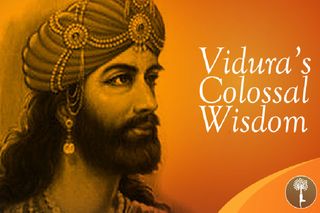Viduras wisdom

WISE SAYINGS OF VIDUR
Mahabharata, the great Indian Epic is unique in the sense one may get all guidelines to lead a healthy.wealthy, spiritual life from it.
In Udyogaparva we come across a beautiful dialogue between Vidur and King Dhrutharashtra. Vidur was the half-brother of Dhrutharashtra.
Part I
He is considered to be the incarnation of Dharma Raja Yama (God of Death). Duryodhana, the son of Dhrutharashtra.refused the demand of Pandavas for minimum compensation.
Worried over the turn of events Dhrutharashtra called Vidur and wanted to hear the policies that must be adopted by all for leading a smooth worldly life.
This portion is called as VidurNeethi.
Vidur Says:
I How to be happy? Discriminating the two by means of the one, bring under thy subjection the three by means of four, and also conquering the five and knowing the six, and abstaining from the seven, be happy. It is very difficult to understand here what is meant by one, two etc.
The learned have explained the meaning thus:
- One means firm intelligence
- Two means determining correctly what is to be done and what not to be done.
- Three means friend, enemy and a neutral person
- Four means Sama,Dana,Bheda, Dhandam. Sama means conciliation. Dana means gifts or compensation.Bheda means usage of Logic or Trickery of mind.Dhanda means force or armaments.
- Five means five senses
- Six means sandhi,vigraham,yanam,asanam, dvidhibhav and samasrayanam
These are the six ways which Code for Kings stipulates.
- Seven means excessive desire of women, playing dice, hunting, drinking, using harsh words, hard punishment and spending money recklessly.
Now if we apply our mind using the above definitions, we will be able to understand what Vidur says.
II What one should not do alone?
Alone one should not partake of any savoury viand, nor alone reflect on concerns of profit, nor alone go upon a journey, nor alone remain awake among sleeping companions.
III Which are the two like thorns on the body?
These two are like sharp thorns afflicting the body, viz., the desires of a poor man, and the anger of the impotent.
(To be continued)
S.Nagarajan
Pic Source: https://vedic-management.com/wp-content/uploads/2017/04/viduraswisdom.jpg
Part II
Some of the sayings of Mahatma Vidur to the king Dhritharashtra is given below:
These two persons never shine because of their incompatible acts, viz., a householder without exertion and a beggar busied in schemes.These two live (as it were) in a region higher than heaven itself, viz., a man of power endued with forgiveness, and poor man that is charitable.
These two should be thrown into the water, tightly binding weights to their necks, viz., a wealthy man that does not give away, and a poor man that is proud.Great fear springs from these three crimes, viz., theft of other’s property, outrage on other’s wives, and breach with friend.
These three, besides, being destructive to one’s own self, are the gates of hell, viz., lust, anger, and covetousness. Therefore, everyone should renounce them.Crowned with prosperity and leading the life of a householder, let this four dwell with you, viz., old consanguineous, relatives, high-born persons fallen into adversity, poor friends, and issueless sisters.
These five fires should be worshipped with regard by a person, viz., father, mother, fire (proper), soul and preceptor.By serving these five, men attain great fame in this world, viz., the gods, the ancestors, men, beggars, and guests.These five follow you wherever you go, viz., friends, foes, those that are indifferent, dependants, and those that are entitled to maintenance.
The six faults should be avoided by a person who wishes to attain prosperity, viz., sleep, drowsiness, fear, anger, indolence, and procrastination.These six should be renounced like a splitting vessel in the sea, viz., a preceptor that cannot expound the scriptures, a priest that is illiterate, a king that is unable to protect, a wife that speak disagreeable words, a cow-herd that doth not wish to go to the fields, and a barber that wish to renounce a village for the woods.Verily, those six qualities should never be forsaken by men, viz., truth, charity, diligence, benevolence, forgiveness, and patience.
These six are always miserable, viz., the envious, the malicious, the discontented, the irascible, the ever-suspicious, and those depending upon the fortunes of others.A king (or in modern times, a leader or an administrator) should renounce these seven faults; women, dice, hunting, drinking, the harshness of speech, the severity of punishment, and misuse of wealth.These eight qualities glorify a man, viz., wisdom, high birth, self-restraint, learning, prowess, moderation in speech, gift according to one’s power, and gratitude.
This house has nine doors, three pillars, and five witnesses. It is presided over by the soul. That learned man who know all this is truly wise. (Meaning : The human body has nine holes. The three pillars are as per ayurveda – vada,pitham,kapam.The five witnesses are five senses)
These ten do not know what virtue is viz., the intoxicated, inattentive, the raving, the fatigued, the angry, the starving, the hasty, the covetous, the frightened, and the lustful. Therefore, he that is wise must eschew the company of these.One should read Vidurneethi so that he could lead a successful healthy, wealthy and spiritual life.
